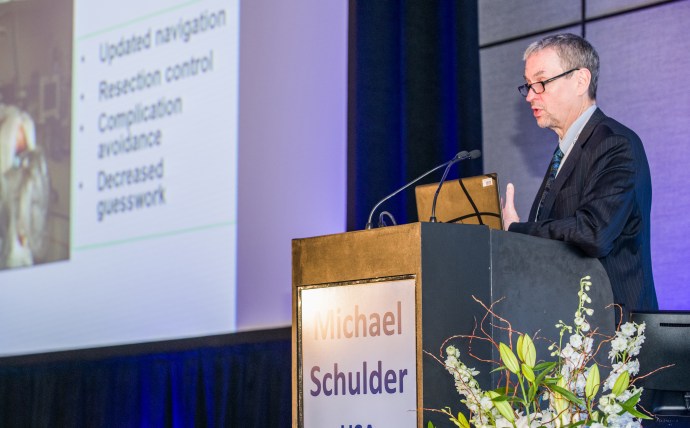The 18th biennial meeting of the World Society for Stereotactic and Functional Neurosurgery was attended by nearly 1,000 neurosurgeons and other practitioners from 58 countries, making it the largest meeting in the society’s history.
The WSSFN is the principal international organization that unites neurosurgeons, physicians in other fields and some engineers to advance the science and practice of stereotactic and functional neurosurgery. Practitioners in this subspecialty care for patients with movement disorders such as Parkinson’s disease, epilepsy, medically untreatable pain and brain tumors.
The event, held from June 24 to 27 at the Midtown Hilton Hotel in Manhattan, was co-hosted in collaboration with Kenes International and chaired by Michael Schulder, MD, who just completed his term as the society’s president. Schulder is also Northwell Health’s vice chair of neurosurgery at North Shore University Hospital in Manhasset and Long Island Jewish Medical Center in New Hyde Park.
“The WSSFN has become an organization acknowledged all over the world as the meeting place for stereotactic and functional neurosurgeons,” said Schulder, who is also director of the Brain Tumor Center at Northwell Health’s Institute for Neurology and Neurosurgery and co-director of the Center for Stereotactic Radiosurgery at Northwell Health’s Cancer Institute. “WSSFN membership has grown steadily from 200 members a decade ago to now having nearly 1,200 members today.”
At the biennial meeting, there were 180 oral presentations and 276 posters, covering topics that relate to the concepts of stereotactic surgery, such as how precise targeting of brain structures can be done safely to treat patients with tumors, movement disorders, epilepsy and other conditions. In addition, this year’s meeting had a strong focus on the ethics of surgery and research, with sessions that included a special film presentation on psychiatric surgery. Among the presentations were:
- Paul Larson, MD, of the University of California San Francisco, who discussed a phase I study using deep brain stimulation for patients with severe and medically refractory tinnitus. Research showed how surgery can provide relief via stimulation of the caudate nucleus, located toward the front of the brain. The study showed that the treatment was safe and its encouraging results should pave the way for an expanded trial to analyze the efficacy of the procedure, and the factors that contribute to its success.
- Ali Rezai, MD, of West Virginia University, who demonstrated that by using non-invasive, low-intensity focused ultrasound treatments, the blood-brain barrier can be safely opened in the hippocampus of patients with Alzheimer’s disease. This method may lead to a variety of medical treatments for patients with this condition and deliver drugs at high concentrations in a safe and effective way.

